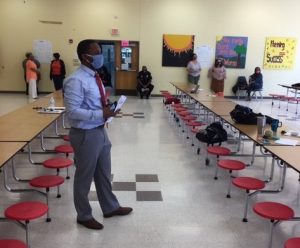TL:DR:
- Pandemic leadership is a new experience for all leaders; you likely won’t find tips in your bag of experiences.
- Necessary pandemic leadership qualities include supporting teachers, being transparent and open with teachers, and understanding that self-care is not a sign of weakness.
In your best Sophia Petrillo imitation: “Picture it; March 2020…Everywhere… Along came COVID.” (Feel free to sing that to the tune of Ray Stevens’ song Along Came Jones—it will give this point much more feeling.) Mapping and scanning are two significant (pandemic) leadership skills for school leaders. We must be able to observe the political climate, notice changes in the economy, or perceive any other issue on the horizon which may affect our school district. Effective leaders use mapping and scanning strategies to create a proactive plan in order to be prepared for such issues.
Pandemic leadership: No time to plan!
The COVID-19 pandemic did not give leaders the opportunity to create such a plan. Instead of noticing this issue on the horizon, this pandemic was the deer that jumps out of the woods on a dark night and slams into the grill of your car.
In my position in Leadership Development with the Arkansas Leadership Academy, one advantageous aspect of the work has been being able to use my experience to support the leaders with whom I work. When a leader is faced with a certain situation, very rarely have I not been able to reach into my bag of experiences and share how I handled the issue. How to effectively lead a school during a national pandemic is nowhere to be found in my bag of experiences.
As leaders strive to ensure safety and health for all members of the school team, we must not forget that a healthy leader is much more effective than an exhausted leader. Share on XMy experience bag was empty of pandemic leadership-related experiences.
In order to add this knowledge to my bag, I knew that I must reach out to those leaders who are currently living this life each day. I wondered how they had to adapt to the changes. What leadership skills are most necessary during this time? How has leadership changed during this time? What are the greatest challenges of leading during a pandemic?
After visiting with several leaders in multiple states, I knew that I wanted to use this blog platform to share the high points from my conversations.
The most essential leadership quality needed right now is support for teachers.
Due to this pandemic, teaching looks unlike it ever has. As mentioned in this space before, teachers have added a whole new job onto their instructional plate: virtual teaching. Teachers are responsible for all aspects of teaching—planning, assessing, monitoring progress—for students who are on-site, virtual, and blended. This is extremely challenging, and leaders must be able to lead by being supportive of the needs of the teachers.
A focus on personal safety is a much-needed leadership skill in 2020.
Leaders are responsible for ensuring the personal safety of the adults in the building as well as the students. Unlike times of the past, our adults are facing health issues each time they walk into the school, and many of them bring with them pre-existing conditions or are at high risk. This is the epitome of dedication! A teacher told me recently that she understands the risks but making sure her students are getting what they need academically is her focus. The leaders with whom I visited mentioned that doing everything possible to ensure a safe and healthy environment is a priority.
Teachers must be able to walk into their classrooms knowing that the leader has done everything possible to ensure a safe teaching and learning environment.
Leaders must be transparent and openly communicate with teachers.

Every one of the leaders mentioned the importance of transparency and communication. This skill is essential in a “normal” school setting, but especially vital during this time. New mandates or expectations are coming forth almost daily, and leaders must openly share such information and be transparent. Teachers must be able to trust that the leaders are sharing essential information and will effectively lead during times of change.
Self-care for leaders is not a sign of weakness.
As leaders, we must often reflect strength and invulnerability, but leaders are human. As leaders strive to ensure safety and health for all members of the school team, we must not forget that a healthy leader is much more effective than an exhausted leader. Leaders should not feel guilty about taking time for themselves in order to stay healthy physically and emotionally.
[scroll down to keep reading]Teaching and learning are important, but people are more important.
I am sure that you noticed these three leadership components listed above did not focus on the instructional leadership part of leadership. All leaders mentioned that a significant part of their leadership currently is to ensure that effective teaching and student learning continue to take place, but their foundation is all about “taking care of their people.”
A colleague of mine put it this way, “As I lead throughout the day, my goal is to lead through the eyes of my teachers.”
One of my favorite philosophers, the wise Andy Griffith, once told his deputy, Barney Fife, “When you are dealing with people, it is best to lead more with the heart than by the book.” That could not be any truer than right during a pandemic in our public schools.
About Blaine Alexander
Dr. Alexander is currently serving his eleventh year as a Leadership Performance Coach with the Arkansas Leadership Academy through the University of Arkansas. Prior to his current experience in leadership development, Dr. Alexander served as a school administrator for 17 years. His research focuses on developing collaborative cultures founded on trust and respect and immersed in student and adult learning. Dr. Alexander’s dissertation explores the factors necessary for student voice to be institutionalized and taken to scale in a school district. Each year, he facilitates learning for students and teachers in the Arkansas Leadership Academy’s Student Voice Institute.
Education:
B.A. Harding University, Searcy, Arkansas
M.Ed. Harding University, Searcy, Arkansas
Ed.D. University of Arkansas, Fayetteville, Arkansas
Dissertation: Student Voice Initiative: Exploring Implementation Strategies



